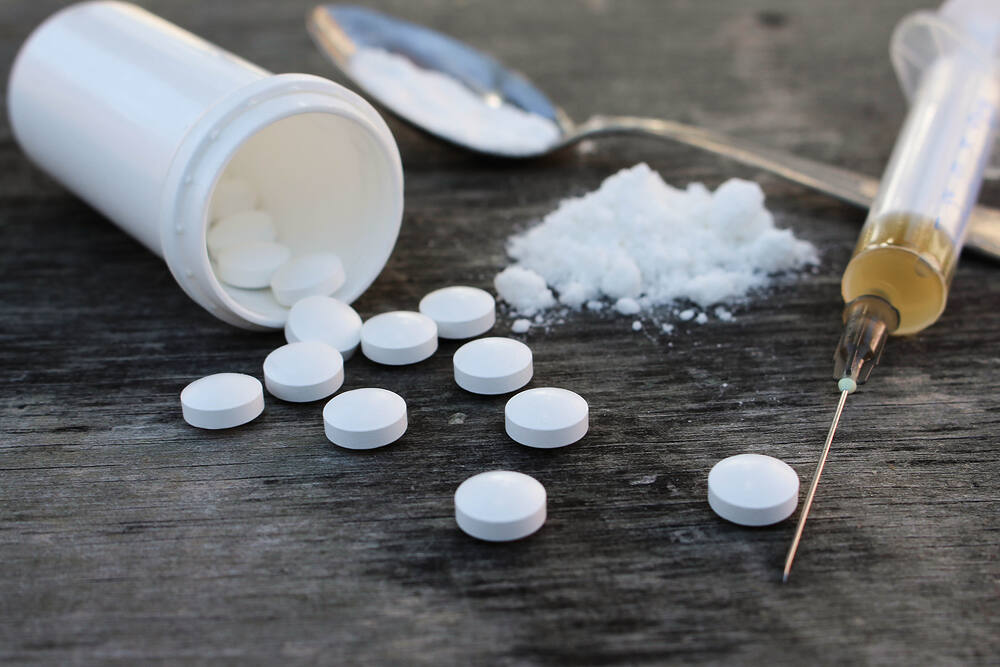Oxycodone, even when used as prescribed, has a high incidence of creating tolerance & addiction. When abused, oxycodone can easily lead to an overdose in an individual with low opiate tolerance.
Oxycodone is one of the most powerful painkiller drugs available. While it is only intended to treat severe pain, it is very sought after by drug abusers due to its considerable euphoric effects.
It is usually only prescribed for acute pain conditions such as post-operative pain or for those with long term, chronic pain who have become tolerant to other less powerful opiate drugs.
Overdose and death can also occur from mixing with another depressant drug such as opiates, alcohol or sedatives.
For Addiction Help Call Us Now
What is Oxycodone?
Oxycodone is a strong semi-synthetic opioid painkiller, commonly prescribed to treat severe pain and during palliative care for end of life patients. It belongs to a group of medicines known as opioid analgesics.
In the UK, oxycodone is a Class A, Schedule II controlled medication. It is labelled as a high-alert medicine, alongside other heavyweight opiate drugs, including fentanyl, diamorphine hydrochloride (heroin), morphine and methadone. 1
The drug works very well independently but can also be combined with other analgesic drugs for increased pain-relieving benefits. For example, oxycodone is commonly combined with acetaminophen (paracetamol) to make a separate, more effective narcotic painkiller 2
Common brand names of oxycodone combined with paracetamol include Percocet, Endocet, Roxicet, Roxicet 5/500, Tylox, Magnacet and Primalev. Oxycodone can also be effectively combined with aspirin or antihistamines 2
Oxycodone’s effects start to work within 15 to 30 minutes of administration, with full pharmaceutical benefits being felt within an hour. The drug provides effective pain relief for up to 4 hours, depending on the patient’s tolerance levels.
Common brand names for oxycodone include Oxynorm, OxyContin, Endone, Proladone and Targin and comes in immediate-release tablets, capsules, suppositories and oral solutions in a variety of strengths.
Slang terms for oxycodone include Hillbilly heroin, Oxy, Ox, OC and O.
Oxycodone’s effects
Effects are different for everyone, but effects may include:
- Constipation
- Difficulty urinating
- Drug cravings
- Confusion
- Dizziness
- Dry mouth
- Constricted pupils
- Stomach ache and nausea
- Relaxation
- Lethargy
- Euphoria – an intense feeling of well being and contentment
- Sleepiness
- Slow pulse rate
- Reduced respiratory rate
- Powerful pain relief
- Slurred or delayed speech
- Restlessness
- Itchy skin or the feeling of skin-crawling
- Sweating and flushing
- Impaired decision making and concentration
- Slowed reaction time
- Sexual dysfunction
- Anxiety
- Depression 3[/su_note]
Administering oxycodone by injection increases the risk of:
- Abscesses
- Infection
- Collapsed veins
- Tetanus 3
Sharing needles with other people or using unclean works increases the risk of :
- Hepatitis B & C
- Infection
- HIV 3
If you mix oxycodone with alcohol, another opiate or sedative, there is an increased risk of respiratory failure, coma and death. Overdose is also more likely if you abuse oxycodone by injecting it (unprescribed) or taking more than your body is used to.
For Addiction Help Call Us Now
Oxycodone Vs Oxycontin – What’s the difference?
Oxycontin differs from oxycodone in that oxycontin is intended for around the clock pain relief and comes in an extended-release form.
Oxycontin only needs to be administered every 12 hours, whereas oxycodone needs to be administered every 4 to 6 hours for continuous pain relief 4
In cases where severe pain is still being felt whilst being treated with oxycontin, oxycodone may be used in addition as a top-up to prevent or treat breakthrough pain.
Oxycodone’s use is more flexible due to its immediate release and so is often used for post-operative procedures and quick but painful procedures in the emergency department. Oxycontin tends to be prescribed for around the clock pain relief in end of life patients suffering from illnesses such as terminal cancer.
Due to its quick release, oxycodone is more prone to being abused than Oxycontin and is considered the more addictive. It is, however, important to understand that both drugs cause drug tolerance and addiction, and in the wrong hands, both drugs can be deadly.
Abuse of Oxycodone is hazardous and can easily lead to drug addiction and drug dependence. According to statistics from the Office of National Statistics, between 2012 and 2016, there were 265 deaths due to Oxycodone.
How oxycodone works
Oxycodone medication works by attaching itself to the brain’s opioid receptors and changing how the brain interprets pain, thus providing very effective pain relief.
In addition to the powerful pain-relieving effects, it also initiates a mass release of dopamine and endorphins into the brain, producing pronounced euphoria. Oxycodone’s euphoric effects, quick onset, and longevity make the drug sought after by drug abusers. It also makes it a highly addictive and dangerous drug.
Once an individual has become used to the drug, they will no longer feel the euphoric effects. The euphoria is also less pronounced in those taking the medication as prescribed, and this is because the medication works as it should and focuses on relieving pain.
Drug abusers, however, will find that they quickly lose the sought after Oxy high and will need to take increasing amounts as a result.
Oxycodone tolerance and dependence
The drug can quickly cause drug tolerance and dependence when used continuously for more than 3 to 5 days.
Once individuals have developed a dependence, they will experience very unpleasant withdrawal symptoms if they abruptly stop taking the drug.
Drug addiction occurs when the body and brain have become used to a certain dosage of an addictive substance and requires more to feel its full effects.
Tolerance and dependence can also easily occur through following a genuine prescription.
Addiction to oxycodone is considered a life-threatening condition that requires very specialist medical and therapeutic treatment (ideally delivered simultaneously).
If you abuse the drug and want to stop, you mustn’t stop abruptly. Going ‘cold turkey’ will result in very severe opioid withdrawal symptoms that could become life-threatening. You will need to seek professional medical advice and support to help wean off.
For Addiction Help Call Us Now
Oxycodone abuse and addiction, signs and symptoms
If you have concerns that you or someone you love may be addicted to oxycodone, it is important to seek professional help without delay. Oxycodone abuse and addiction kills.
We at Detox Plus UK provide professional drug detox and rehabilitation for all manner of illicit and prescribed drugs. You can call us today for immediate oxycodone help and treatment.
Signs and symptoms of oxycodone abuse and addiction include:
- Numerous pill packets, bottles, blister strips (full or empty), or injection paraphernalia in a person’s possession
- Using more than one doctor to obtain multiple prescriptions
- Buying oxycodone off the internet/street dealers
- Disinterest in family time, friends and hobbies
- Increasing isolation and depression
- Stealing or obtaining the drug from a family member or friend
- Taking oxycodone other than the way it is prescribed, whether that be taking more than prescribed or diverting the route of administration
- Lying to others and medical professionals about the use
- Mixing oxycodone with alcohol or other drugs (illicit or prescribed) for greater effect
- Continuing to use despite negative consequences resulting from drug use
- Using purely for its euphoric effects
- Suffering intense and overwhelming cravings
- Weight Loss, neglect of personal appearance
- Personal relationships/work/finances/mental health/physical health start to suffer due to oxycodone abuse.[/su_note]
You can access private CQC registered rehab today by calling Detox Plus UK and speaking with one of our friendly addiction experts.
Oxycodone withdrawal & timeline
Like all opiates and opioids, oxycodone is very unpleasant to withdraw from. Especially in the cases of a long-standing dependence or addiction, a full medical detox is clinically recommended as the safest course of action.
Oxycodone withdrawal symptoms include:
- Anxiety and panic attacks
- Depression
- Dysphoria
- Strong cravings
- Nausea, vomiting, stomach cramps, diarrhoea
- Restlessness
- Insomnia
- Excessive sweating
- Muscle cramps, aches and pains
- Fever
- Increased blood pressure
- Palpitations
- Paranoia
- Suicidal ideation or self-harm tendencies
- Loss of appetite
- Seizures
The higher the dosage and the longer you have been oxycodone dependent, the more severe withdrawal symptoms will be.
Undergoing a full medical detox will vastly reduce the severity of the withdrawal symptoms and reduce the chances of developing PAWS (Post Acute Withdrawal Syndrome)
The oxycodone withdrawal timeline starts around 4 to 12 hours after the last dose of the drug. Symptoms peak at around 3 to 4 days and start to taper off after 5 to 7 days. In an unmanaged detox, symptoms can come and go for months or even years after stopping the drug.
Addiction treatment
Treatment for addiction needs to target the underlying causes of the condition and heal on a physical, mental, emotional, social and spiritual level.
Addiction is a chronic and progressive disorder of the brain, characterised by compulsive drug seeking and taking despite negative consequences. Due to addictions high relapse rate, treatment should ideally be deliberately intensive and immersive and consist of various behavioural therapies to help transform the individuals thinking and coping mechanisms.
For a person to recover from addiction, treatment needs to consist of three key components delivered in the following order:
- Treatment for any physical oxycodone abuse in the form of a full medical detox
- A comprehensive bespoke rehabilitation programme consisting of evidence-based addiction treatments to treat and heal the person as a whole
- A personalised aftercare programme to support the patient’s transition from active addiction to recovery in the community
Removing the drug safely is only the tip of the iceberg when treating addiction successfully. Unless the individual undergoes comprehensive rehabilitation, relapse is almost inevitable.
Detox Plus UK provide a confidential free addiction triage assessment over the phone. We will take the time to listen to your individual circumstances and advise you on the best course of action to suit your treatment needs, budget and location.
Rehab
If you or a loved one require rehab for oxycodone addiction or abuse, Detox Plus UK can help.
At Detox Plus UK, we provide professional, ethical treatment for anyone suffering from a problem with oxycodone. Our private drug rehab clinics are all CQC registered and specialise in detox and addiction rehabilitation.
We know how hard it is to recover from oxycodone addiction, but we also know that it is possible with the right help and support. We are passionate about helping our patients achieve their goals and take a person-centred approach to treatment, healing every aspect of their lives.
Our rehabs offer the latest cutting-edge addiction treatment and are staffed by some of the UK’s most distinguished counsellors and addiction therapists. We can help you take back control of your life, starting today.
Call us today for more information on our bespoke rehab programmes and find out exactly how we can help you or a loved one to become oxycodone free.
References:
- NICE Controlled drugs and drug dependence. Regulations and classification. https://bnf.nice.org.uk/guidance/controlled-drugs-and-drug-dependence.html
- ConsumerSafety.org – oxycodone with acetaminophen https://www.consumermedsafety.org/tools-and-resources/medication-safety-tools-and-resources/high-alert-medications/oxycodone-with-acetaminophen-percocet-roxicet
- Alcohol and Drug Foundation – https://adf.org.au/drug-facts/oxycodone/
- Oxycodone vs Oxycontin https://www.healthline.com/health/pain-relief/oxycodone-vs-oxycontin#interactions



